小升初英语句型总复习
- 格式:docx
- 大小:17.81 KB
- 文档页数:4
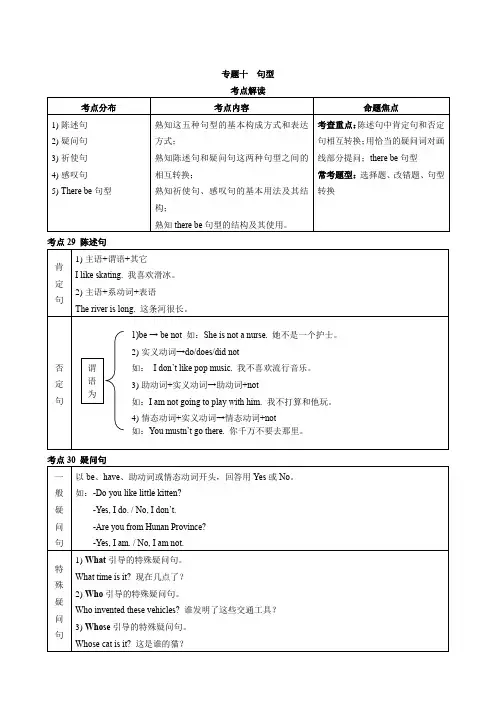
专题十句型考点29 陈述句考点30 疑问句考点31 祈使句考点32 感叹句【经典分析】【例1】I have some pens.(把肯定句改成否定句)[思路指导]句意:我有一些笔。
此句中,have是谓语动词。
变成否定句时,在have前加do的相应否定形式。
主语是第一人称I,所以在have前加do not。
并注意some用在肯定句,否定句中要换成any。
[参考答案]I don’t have any pens.【例2】-Are you new interns(实习生)?-Yes, .A. they areB. you areC. I amD. we are[思路指导]句意:你们是新的实习生吗?是的,我们是。
此句中,主语是you,可以译为你或你们,所以肯定回答中的主语是I或we。
然后,在句的末尾出现的表语为名词复数interns,由此可以判断出主语为we。
[参考答案]D【例3】play chess.A. LetB. Let meC. LetsD. Let’s[思路指导]句意:我们一起下象棋吧。
由句意可以看出是在提议作某件事情,并且可以看出宾语不是一个人,而是多个人。
因而要用Let us,其缩写形式为Let’s。
[参考答案]D【例4】heavy rain it was!A. WhatB. What aC. HowD. How a[思路指导]句意:好大的一场雨啊!根据题干中结构heavy rain it was=形容词+名词+主语+谓语,可以判断出该感叹语有what引导。
所以答案在A和B之间产生。
rain在这里是可数名词,译为一场雨。
所以应该在what后面加a。
[参考答案]B【例5】There a boy and three girls in the team.A. isB. areC. amD. be[思路指导]句意:队里有一个男孩和三个女孩。
根据就近原则,There be句子中有两个或两个以上主语时,be与最靠近的主语保持一致。
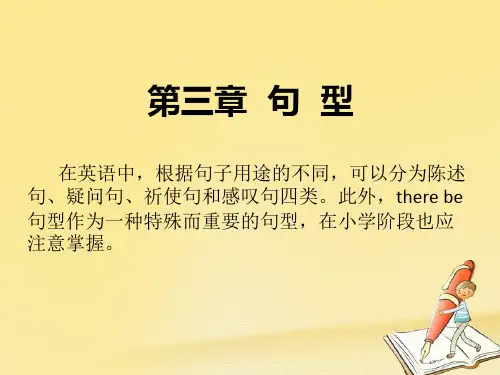
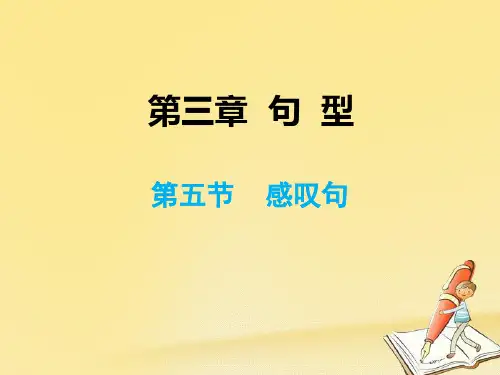
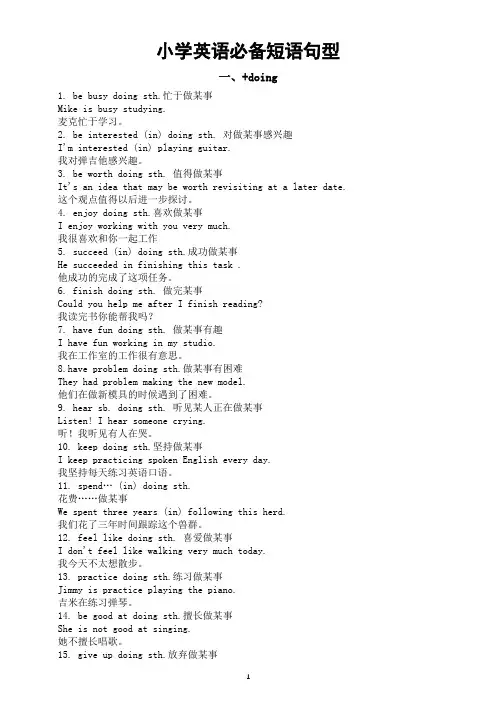
小学英语必备短语句型一、+doing1. be busy doing sth.忙于做某事Mike is busy studying.麦克忙于学习。
2. be interested (in) doing sth. 对做某事感兴趣I'm interested (in) playing guitar.我对弹吉他感兴趣。
3. be worth doing sth. 值得做某事It's an idea that may be worth revisiting at a later date. 这个观点值得以后进一步探讨。
4. enjoy doing sth.喜欢做某事I enjoy working with you very much.我很喜欢和你一起工作5. succeed (in) doing sth.成功做某事He succeeded in finishing this task .他成功的完成了这项任务。
6. finish doing sth. 做完某事Could you help me after I finish reading?我读完书你能帮我吗?7. have fun doing sth. 做某事有趣I have fun working in my studio.我在工作室的工作很有意思。
8.have problem doing sth.做某事有困难They had problem making the new model.他们在做新模具的时候遇到了困难。
9. hear sb. doing sth. 听见某人正在做某事Listen! I hear someone crying.听!我听见有人在哭。
10. keep doing sth.坚持做某事I keep practicing spoken English every day.我坚持每天练习英语口语。
11. spend… (in) doing sth.花费……做某事We spent three years (in) following this herd.我们花了三年时间跟踪这个兽群。

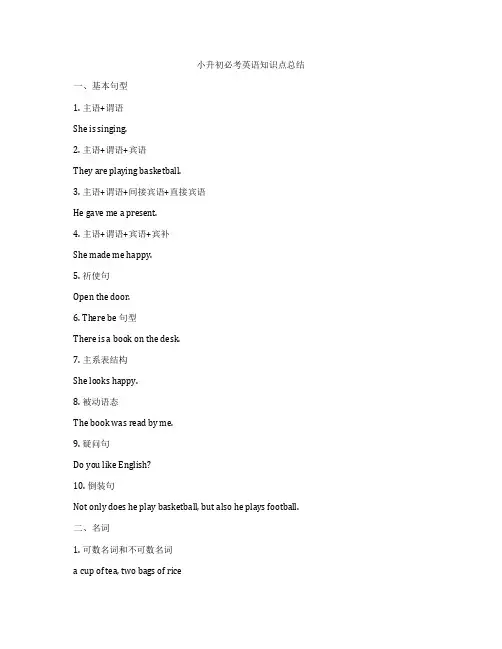
小升初必考英语知识点总结一、基本句型1. 主语+谓语She is singing.2. 主语+谓语+宾语They are playing basketball.3. 主语+谓语+间接宾语+直接宾语He gave me a present.4. 主语+谓语+宾语+宾补She made me happy.5. 祈使句Open the door.6. There be 句型There is a book on the desk.7. 主系表结构She looks happy.8. 被动语态The book was read by me.9. 疑问句Do you like English?10. 倒装句Not only does he play basketball, but also he plays football.二、名词1. 可数名词和不可数名词a cup of tea, two bags of rice2. 名词的所有格my father's car3. 名词的单复数a book, two books4. 特殊名词的复数形式child-children, woman-women5. 特殊名词的不可数名词形式news, information6. 特殊名词的复合名词形式forget-me-not, passer-by三、冠词1. 定冠词和不定冠词a book, the book2. 不加冠词的情况He is a student.3. 特殊用法once upon a time四、代词1. 人称代词I, you, he, she, it, we, they2. 物主代词my, your, his, her, its, our, their3. 反身代词myself, yourself, himself, herself, itself, ourselves, themselves 4. 特殊用法one another, each other五、动词1. 一般现在时He plays basketball every day.2. 一般过去时I played computer games yesterday.3. 一般将来时I will go to the park tomorrow.4. 现在进行时She is reading a book now.5. 过去进行时He was playing basketball at this time yesterday.6. 情态动词can, may, must, should, need7. 动词的不定式to do, to be8. 动词的-ing形式reading, playing9. 动词的完成时I have read that book.10. 动词的被动语态The book was read by me.11. 及物动词和不及物动词I like singing.六、形容词和副词1. 形容词的比较级和最高级big-bigger-biggest2. 副词的用法She sings well.3. 物主形容词my, your, his, her, its, our, their4. 特殊形容词和副词good-better-best, well-better-best七、介词1. in, on, at的用法in the classroom, on the desk, at home2. 特殊介词的用法under, over, between, among3. 介词短语in front of, next to, to the left of4. 介词词组on time, in time八、连词1. and, but, or的用法She likes playing basketball and football.2. because, so的用法He is tired because he works hard.3. 特殊连词的用法either...or, neither...nor, not only...but also...九、数词1. 基数词和序数词one, first2. 特殊数词的用法the first of October, one and a half 3. 特殊用法three times a week, two hours' time十、时间1. 日常时间的表达at seven o'clock, in the morning2. 一般现在时表示的未来情况I leave for Beijing tomorrow.3. 特殊时间状语的用法last Sunday, next Tuesday十一、情态动词1. can, may, must, shouldI can swim.2. 特殊情态动词的用法would like, need3. 特殊用法had better, have to十二、虚拟语气1. if引导的虚拟条件句If I were you, I would go now.2. wish引导的虚拟句I wish I were a bird.3. 特殊用法It's high time, If only十三、疑问句和感叹句1. 一般疑问句Do you like English?2. 特殊疑问句What's your name?3.感叹句What a nice day it is!四、定语和被定语1. 定语的位置和形式the red book, the book on the desk2. 被定语的位置和形式a city of the world, a boy with big eyes3. 特殊用法a cup of tea, the mother of all rivers 十五、主谓一致1. 就近原则Neither she nor I am good at singing.2. 特殊用法There be 句型十六、宾语从句1. 特殊宾语从句的引导词I know who the man is.2. 特殊宾语从句的时态I think he will come soon.十七、主语从句1. 特殊主语从句的引导词What you have said is true.2. 特殊主语从句的时态It's clear that they have won the game. 十八、定语从句1. 特殊定语从句的引导词The boy who is swimming is my friend.2. 特殊定语从句的时态I have lost the pen that you gave me.十九、状语从句1. 时间状语从句When the bell rang, we stopped working.2. 地点状语从句Where there is a will, there is a way.3. 原因状语从句Because he was ill, he didn't go to work.4. 条件状语从句If I were you, I would go now.5. 结果状语从句It's so late that we can't go out.六、语音1. 单词中元音的发音cake, team2. 单词中辅音的发音break, cream3. 单词重读音节的规律beautiful, comfortable4. 特殊音标的发音ai, ee, th七、词汇1. 同义词happy-glad, big-large2. 反义词happy-sad, big-small3. 同音词see-sea, for-four4. 词根act, behave5. 词缀happy-unhappy, Sunday-weekend 8、语法1. 句子成分的转换He doesn't like playing basketball. Playing basketball is not liked by him.2. 句子类型的转换She can swim. - Can she swim?十九、阅读1. 阅读理解阅读短文,回答问题。
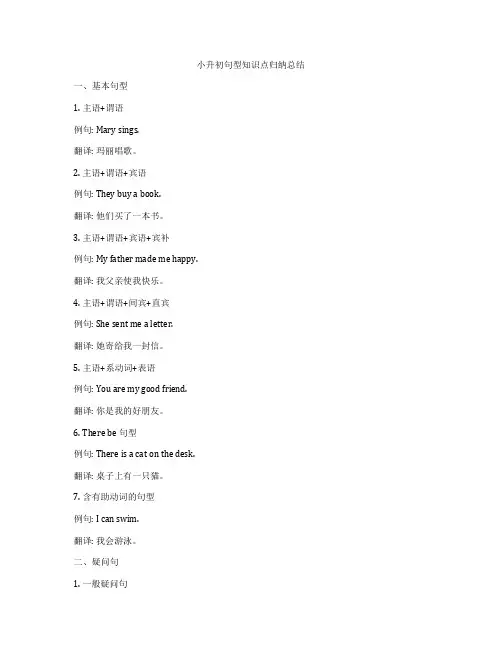
小升初句型知识点归纳总结一、基本句型1. 主语+谓语例句: Mary sings.翻译: 玛丽唱歌。
2. 主语+谓语+宾语例句: They buy a book.翻译: 他们买了一本书。
3. 主语+谓语+宾语+宾补例句: My father made me happy.翻译: 我父亲使我快乐。
4. 主语+谓语+间宾+直宾例句: She sent me a letter.翻译: 她寄给我一封信。
5. 主语+系动词+表语例句: You are my good friend.翻译: 你是我的好朋友。
6. There be 句型例句: There is a cat on the desk.翻译: 桌子上有一只猫。
7. 含有助动词的句型例句: I can swim.翻译: 我会游泳。
二、疑问句1. 一般疑问句例句: Are you a student?翻译: 你是学生吗?2. 特殊疑问句例句: What’s your name?翻译: 你叫什么名字?三、否定句1. 否定句例句: I don’t like bananas.翻译: 我不喜欢香蕉。
2. 否定意义句例句: He can’t swim.翻译: 他不会游泳。
四、祈使句例句: Close your book.翻译: 关上你的书。
五、感叹句例句: How beautiful the flowers are! 翻译: 这些花多美啊!六、陈述句变疑问句例句: He is a teacher. → Is he a teacher?七、介词短语1. in the morning例句: I get up at 7:00 in the morning. 翻译: 我早上7点起床。
2. at school例句: We have English class at school.翻译: 我们在学校上英语课。
八、对等连接词1. and例句: I like basketball and football.翻译: 我喜欢篮球和足球。
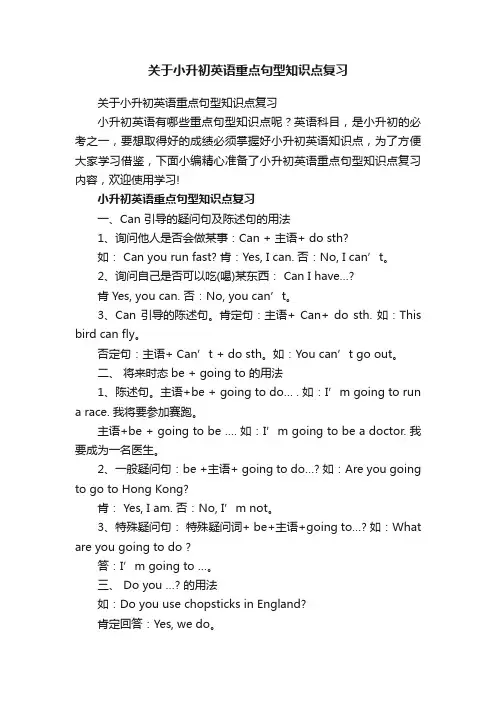
关于小升初英语重点句型知识点复习关于小升初英语重点句型知识点复习小升初英语有哪些重点句型知识点呢?英语科目,是小升初的必考之一,要想取得好的成绩必须掌握好小升初英语知识点,为了方便大家学习借鉴,下面小编精心准备了小升初英语重点句型知识点复习内容,欢迎使用学习!小升初英语重点句型知识点复习一、Can 引导的疑问句及陈述句的用法1、询问他人是否会做某事:Can + 主语+ do sth?如: Can you run fast? 肯:Yes, I can. 否:No, I can’t。
2、询问自己是否可以吃(喝)某东西:Can I have…?肯 Yes, you can. 否:No, you can’t。
3、Can 引导的陈述句。
肯定句:主语+ Can+ do sth. 如:This bird can fly。
否定句:主语+ Can’t + do sth。
如:You can’t go out。
二、将来时态be + going to 的用法1、陈述句。
主语+be + going to do… . 如:I’m going to runa race. 我将要参加赛跑。
主语+be + going to be …. 如:I’m going to be a doctor. 我要成为一名医生。
2、一般疑问句:be +主语+ going to do…? 如:Are you going to go to Hong Kong?肯: Yes, I am. 否:No, I’m not。
3、特殊疑问句:特殊疑问词+ be+主语+going to…? 如:What are you going to do ?答:I’m going to …。
三、Do you …? 的用法如:Do you use chopsticks in England?肯定回答:Yes, we do。
否定回答:No, we don’t。
这个句型是在询问某人是否做某事的'情况下用的,在回答这类疑问句时,注意人称和肯定、否定用法就可以了。
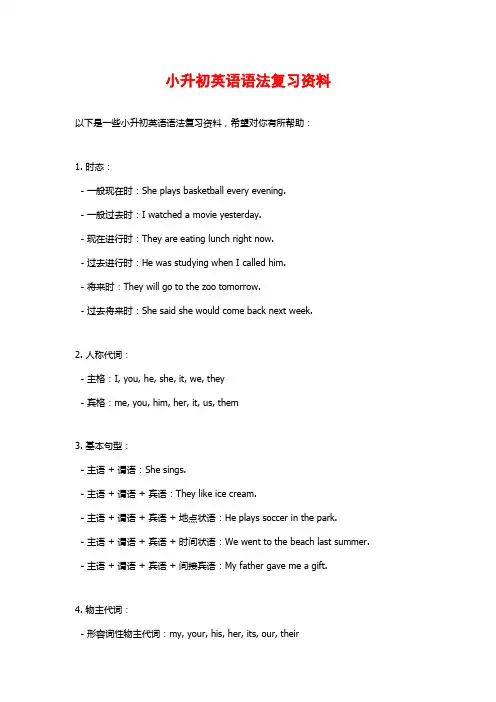
小升初英语语法复习资料以下是一些小升初英语语法复习资料,希望对你有所帮助:1. 时态:- 一般现在时:She plays basketball every evening.- 一般过去时:I watched a movie yesterday.- 现在进行时:They are eating lunch right now.- 过去进行时:He was studying when I called him.- 将来时:They will go to the zoo tomorrow.- 过去将来时:She said she would come back next week.2. 人称代词:- 主格:I, you, he, she, it, we, they- 宾格:me, you, him, her, it, us, them3. 基本句型:- 主语 + 谓语:She sings.- 主语 + 谓语 + 宾语:They like ice cream.- 主语 + 谓语 + 宾语 + 地点状语:He plays soccer in the park.- 主语 + 谓语 + 宾语 + 时间状语:We went to the beach last summer. - 主语 + 谓语 + 宾语 + 间接宾语:My father gave me a gift.4. 物主代词:- 形容词性物主代词:my, your, his, her, its, our, their- 名词性物主代词:mine, yours, his, hers, ours, theirs5. 疑问句:- 一般疑问句:Do you like pizza?- 特殊疑问句:Where is your sister?6. 数量词:- 复数形式:books, apples, cars- 单数形式:book, apple, car7. 形容词的比较级与最高级:- 比较级:taller, more beautiful- 最高级:the tallest, the most beautiful8. 名词所有格:- 单数名词所有格:Tom's book- 复数名词所有格:the students' desks9. 不规则动词:- 动词原形:go, eat, drink- 过去式:went, ate, drank10. 句子的连接词:- 并列连词:and, but- 时间连词:after, before- 原因连词:because, so这些都是小升初英语语法的一些基本知识点,希望对你的复习有所帮助。
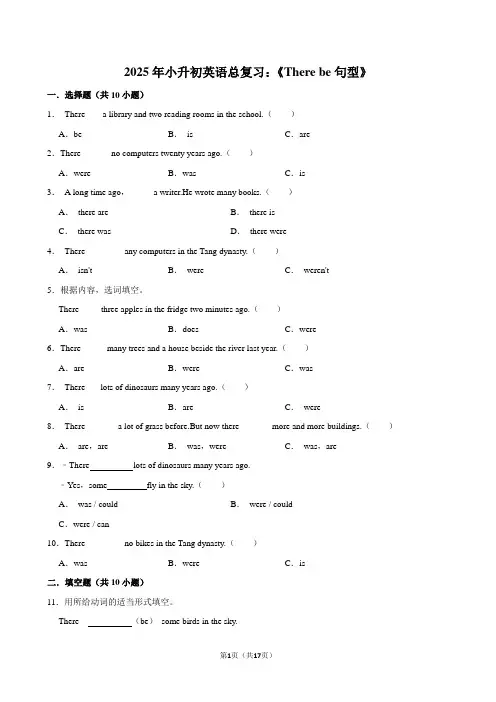
2025年小升初英语总复习:《There be句型》一.选择题(共10小题)1.There ___ a library and two reading rooms in the school.()A.be B.is C.are2.There ______ no computers twenty years ago.()A.were B.was C.is3.A long time ago,_____ a writer.He wrote many books.()A.there are B.there isC.there was D.there were4.There_________any computers in the Tang dynasty.()A.isn't B.were C.weren't5.根据内容,选词填空。
There_____three apples in the fridge two minutes ago.()A.was B.does C.were6.There______many trees and a house beside the river last year.()A.are B.were C.was7.There___ lots of dinosaurs many years ago.()A.is B.are C.were8.There _______a lot of grass before.But now there _______more and more buildings.()A.are,are B.was,were C.was,are9.﹣There lots of dinosaurs many years ago.﹣Yes,some fly in the sky.()A.was / could B.were / couldC.were / can10.There ________ no bikes in the Tang dynasty.()A.was B.were C.is二.填空题(共10小题)11.用所给动词的适当形式填空。
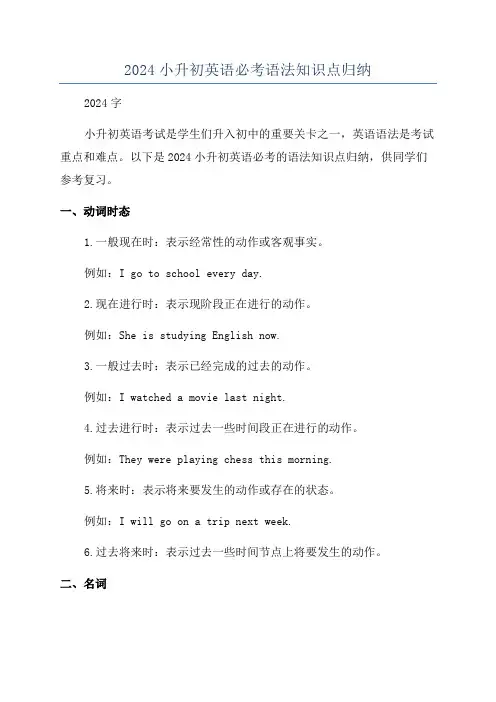
2024小升初英语必考语法知识点归纳2024字小升初英语考试是学生们升入初中的重要关卡之一,英语语法是考试重点和难点。
以下是2024小升初英语必考的语法知识点归纳,供同学们参考复习。
一、动词时态1.一般现在时:表示经常性的动作或客观事实。
例如:I go to school every day.2.现在进行时:表示现阶段正在进行的动作。
例如:She is studying English now.3.一般过去时:表示已经完成的过去的动作。
例如:I watched a movie last night.4.过去进行时:表示过去一些时间段正在进行的动作。
例如:They were playing chess this morning.5.将来时:表示将来要发生的动作或存在的状态。
例如:I will go on a trip next week.6.过去将来时:表示过去一些时间节点上将要发生的动作。
二、名词1.可数名词与不可数名词:可数名词有单数和复数之分,不可数名词只有单数形式。
例如:table(可数), water(不可数)2.名词所有格:表示所有关系时,在名词后加's。
例如:Tom's book(汤姆的书)3.复合名词:由两个或两个以上名词构成并有一定结构的名词。
例如:classroom, basketball三、形容词与副词1.形容词用来修饰名词,副词用来修饰动词、形容词或其他副词。
例如:She is a beautiful girl.(形容词修饰名词)He runs fast.(副词修饰动词)2. 形容词的比较级和最高级:一般在形容词后面加-er表示比较级,在形容词前面加the最高级。
例如:He is taller than me.(比较级)He is the tallest boy in our class.(最高级)四、代词1. 人称代词:主格形式有I, you, he, she, it, we, they;宾格形式有me, you, him, her, it, us, them。
小升初英语最常考的八大句型1.So+be/助动词/情态动词/主语。
前面陈述的肯定情况也适于另一人(物)时,常用到这种倒装结构,表示"另一人(物)也如此。
"前面陈述的否定情况也适于另一人(物)时,常用"Neither/Nor+be/助动词/情态动词+主语。
"这种倒装结构。
注意:"So+主语+be/助动词/情态动词。
"这一句型常用于表示赞同,进一步肯定对方的看法,表示"的确如此。
""是呀。
"2.Turn right/left at the first/second/…crossing.这一指路的句型意为"在第一/二/……个十字路口向右/左拐。
"相当于Take the first/second/…turning on the right/left.3.It takes sb.sometime to do sth.此句型表示"干某事花了某人一段时间。
"其中的it 是形式主语,后面的动词不定式(短语)才是真正的主语。
4.…think/find+it+adj.+to do sth.此句型中的it是形式宾语,不可用其它代词替代,形容词作宾语的补足语,后面的动词不定式(短语)才是真正的宾语。
5.What's wrong with…?此句型相当于What's the matter/trouble with…?后跟某物作宾语时,意为"某物出什么毛病了?"后跟某人作宾语时,意为"某人怎么了?"6.too…to…在so…that…复合句中,that后的句子是否定句时,常与简单句too…to…(太……而不能……)进行句型转换。
在so…that…复合句中,that后的句子是肯定句时,常与简单句…enough to…进行句型转换。
7.Sorry to hear that.全句应为I'm sorry to hear that.意为"听到此事我很难过(遗憾)。
There be句型专项训练一、单项填空。
1. ____ there any paper in the desk?____Sorry, I have no idea.A. AreB. IsC. BeD. Has2. Look!There two knives in the pencil-box.A. areB. beC. isD. am3. There a desk, two chairs and three cups in the room.A. beB. areC. isD. were4. There two chairs, a desk and a bed in the room.A. amB. beC. isD. are5.____ is in the box?____There are two apples.A. WhereB. WhenC. WhoD. What6.____What a beautiful garden!____Yes, you are right. But there some old and low houses.A. haveB. isC. used to beD. used to7. There are some pens on the desk, aren’t ?A. theyB. thereC. theseD. those8.____ the radio?____On the table.A. How is thereB. Where isC. Which is thereD. What is there9. Be careful! comes a bus.A. ItB. ThatC. ThisD. There10. He told me that there an interesting movie on at the cinema tomorrow.A. isB. will beC. would beD. is going to be二、用括号内所给动词的适当形式填空。
小升初英语常考句型句型1:There+be +主语+地点状语/ 时间状语There’s a boat in the river.河里有条船。
句型2:What’s wrong with+sb. / sth. ?What’s wrong with your watch?你的手表怎么了?句型3:How do you like...?How do you like China?你觉得中国怎么样?句型4:What do you like about...?What do you like about China?你喜欢中国的什么?句型5:had better(not)+动词原形You’d better ask that policeman over there.你最好去问问那边的那个警察。
句型6:How+adj. / adv. +主语+谓语!What a/ an+adj. +n. +主语+谓语!How cold it is today !今天多冷啊!What a fine picture it is!多美的一幅图画呀!句型7:Thank+sb. +for(doing)sth.Thank you for coming to see me.感谢你来看我。
句型8:So+be/ 情态动词/ 助动词+主语He is a student. So am I.他是一个学生,我也是。
句型9:... not ... until ...He didn’t have supper until his parents came back.直到他的父母回来他才吃饭。
句型10:比较级+and+比较级(越来越......)The baby cried harder and harder.那孩子哭得越来越厉害。
句型11:the +比较级,the +比较级(越来越......)The more one has,the more one wants.越有越贪。
小升初英语句型归类复习汇总1.基本句型-主语+谓语-主语+谓语+宾语-主语+谓语+宾补-主语+谓语+宾语+宾语补足语-主语+谓语+宾语+宾语补足语+间接宾语-主语+谓语+宾语+宾语补足语+定语-主语+谓语+宾语+宾语补足语+状语2.特殊句型- 虚拟条件句:If + 主语 + 谓语(一般过去时),主语 +would/should/could/might + 谓语-直接引语变间接引语:主句动词变为宾句动词的宾语,时态和人称也要相应变化- 同位语从句:名词 + that + 从句,其中从句相当于同位语的内容- 状语从句:when/while/as + 主语 + 谓语,时间状语从句;if/whether + 主语 + 谓语,条件状语从句;because/since/as + 主语+ 谓语, 原因状语从句;although/though/even though + 主语 + 谓语,让步状语从句;unless + ... + 主语 + 谓语,条件状语从句3.句型转换-陈述句变一般疑问句:将句子的语序倒置,句末加问号-一般疑问句变陈述句:将句子的语序还原,删除问号- 肯定句变否定句:在句子前加not或者在助动词后加not- 否定句变肯定句:去掉not-特殊疑问句:以特殊疑问词开头的疑问句,回答时要用具体的信息进行回答4.感叹句- How + 形容词/副词 + 主语 + 谓语- What + a/an + 形容词 + 名词 + 主语 + 谓语5.并列句- 句子 + and/or/but + 句子-句子;句子- 句子,so句子- not only + 句子,but also + 句子6.被动语态- 主语 + be + 过去分词 + by + 完成者- 主语 + have/has been + 过去分词7.定语从句- 关系代词引导:that/which/who/whom/whose, 先行词在从句中作主语时可省略- 关系副词引导:when/where/why8.宾语从句- 宾语 + that + 从句,或直接用从句作宾语9.祈使句-动词原形+宾语(可选)+其他10.条件句-条件句:If+主语+谓语,主句:主语+谓语- 省略if的条件句:主语 + 谓语,主句:主语 + 谓语-现在条件句:If+主语+现在时,主句:主语+谓语- 过去条件句:If + 主语 + 过去时,主句:主语 + would + 谓语以上是一些小升初英语句型的归类复习汇总。
小升初英语40背重点句型与十大语法知识点小学学到的英语词汇与语法不单单在小学用得上,在初中与高中都用得上,所以这些学问是必需要把握的,我在这里整理了英语句子与语法复习资料,希望能帮到您。
小升初英语40背重点句型1. allow sb to do sth 允许某人去做某事(后接动词不定式)My father allowed me to go out for a walk after finishing my homework.2. asked sb (not) to do sth 叫某人做事某事(叫某人不要去做某事)My father asked me to study hard.He asked me not to swim alone.be asked to do sth 被叫去做某事/被邀请去做某事I was asked to have a dinner with them yesterday.3. be afraid to do sth 可怕做某事She is afraid to ask me questions.4. be afaid of doing sth 可怕做某事I am afraid of going out at night.5. be afaid of sth 可怕某物He is afraid of snakes.6. be amazed to do sth 对做某事感到惊异He was amazed to meet the girl there.be amazed at sth 对某事感到惊异they were amazed at the news.7. be busy doing/with sth 忙于做某事(常考)I was busy washing my car at that time. 那时候我正忙于清洗我的车子。
I am busy with my work.8. becoming/going/leaving/fiying/moving/dying(某些位移动词用进行时态时表将来)the bus is coming/the dog is dying.9. be excited to do sth 对做感到兴奋Jacky was excited to travel there by plane.be excited at sthLily was excited at his words.be excited about doing sthhe was excited about passing the exam without going overing books.10. be frightened to do sth 可怕去做某事Sam is frightened to ride a horse.11. be glad/happy to do sth 高兴去做某事She is happy to clean theblackboard with me.be pleased to do sth高兴做某事She was pleased to helpthe old man yesterday.be pleased with sth 对某事感到高兴/满意The teacher was pleasedwith my answer.12.be interested in sth/doing sth 对某事感兴趣/对做某事感兴趣She is interested inswimming in the river.My btother is interestedin Chinese.13. be/get ready for/to do sthbe ready for 为某事做好了预备We are ready for the exam.Be ready to do sth 为做某事做好了预备We are ready to have a birthday party for her.get ready for sth为某事在做预备We are getting ready for the exam.14. be surprised to do sth 对做某事感到惊讶be surprised at sth 对某事感到惊讶This is nothing to be surprised at.Id be surprised to see him on such an occasion.15. be worth doing sth 值得做某事(worth 后接动词-ing形式,常考) It was too remote to be worth thinking about.16. 开始去做某事begin to do sth begin/start to do/doing sthWhen do children begin to go to school?17. can/be able to afford (to buy) sth 有能力负担(购置)At this rate we wont be able to afford a holiday.18. can/may/must do sth could/would/should/might do sthWe may come at another time.19. cant wait todo sth 迫不急待地去做某事I cant wait to hear the news. 20. decide to do sth 确定去做某事make up ones mind to do sth 下决心去做某事(常考)make a decision to do sth 对做某事作出确定What do they decide to do?I have made up my mind to go with him21. deserve to do sth 值得/应当做We must admit that she did deserve to win.22. encourage sb to do sth 鼓舞某人去做某事Encourage them to do some other helpful recreations.23. enjoy doing sth 宠爱去做某事I enjoy reading the story book24. expect (sb) to do sth 期望去做某事Dont expect him to help you.25. fail to do sth 做某事失败succeed doing sth 胜利做了某事If you don t work, you willfail to pass the exam.26. finish doing sth 做完某事(后接动词-ing形式)(常考)After finish doing your homework, you can have a rest.27. follow sb to do sth 跟随某人去做某事Follow me to read the new words.28. get sb to do sth / make sb do sth/ let sb do st 让某人做某事(后接动词原形) Her jokes made us laugh.29. get/have a chance to do sth 得到一个做某事的机会Im very happy to have a chance to visit your school.30. give/pass/show/lend/sell sb sth/sth to sbbuy/get/bring sb sth/sth for sbPlease give me a piece of paper.I bought him a drink in return for his help.31. go on to do sth /go on doing sth 继续做事(常考)Go on doing the exercise after a short rest.32. hate to do/doing sth 厌烦/不宠爱做某事Ihate to tell the news to you.33. have fun doing sth 做某事很好玩Have fun getting to know each other.34. have problems doing sth 做某事遇到困难Many people have problems getting to sleep at night.35. have sb do sth/have sth done 让某人做某事This is the best work you have ever done.36. hear sb do sth 听到某人做某事(后接动词原形,常考) hear sb doing sth 听到某人正在做某事(常见)I heard someone laughing.37. help to do sth 关心做某事help sb (to) do sth 关怀某人做某事Ill help you clean the room. 38. hope/wish to do sth 希望做某事wish sb to do sth 希望某人做某事I wish to take this opportunity to thank you all.39. It seems that 这像是(后接从句)seem to do sthseem +adjItseems that you are lying.Does that seem to make sense?40. Its + adj+(for sb) to do sth .Its+adj +(of sb) to do sthIts glad for him to hear the news.小升初英语必备10大语法学问点一、小学英语形容词性物主代词1、形容词性物主代词8个:My your his her its our your their我的你的他的她的它的我们的你们的他(她、它)们的2、形容词性物主代词的特点:1)译成汉语都有的eg:my 我的their 他们的2)后面加名词:eg:my backpack his name3)前后不用冠词a an theThis is a my eraser(错误) That is your a pen(错误) Its his the pe n(错误)3、I(物主代词)my you(物主代词)your he (物主代词)her we (物主代词) our 注:在变物主代词时,把原题所给的词加上的,再译成单词就可以了。
小升初英语句型总复习
句型
1、肯定句:是指用肯定的语气来陈述的句子,如:i’m a student. she is a doctor. he works in a
hospital.
there are four fans in our classroom. he will eat lunch at 12:00. i watched tv yesterday
evening.
2、否定句:含有否定词或表示否定意义词的句子,如:i’m not a student. she is not (isn’t) a doctor.
he does not (doesn’t) work in a hospital. there are not (aren’t) four fans in our classroom.
he will not (won’t) eat lunch at 12:00. i did not (didn’t) watch tv yesterday evening.
☆注意☆小结:否定句主要是在肯定句的基础上加上了否定词“not”。
有动词be的句子则“not”加在be后面,可缩写成“isn’t,aren’t”,但am not 一般都分开写。
没有动词be
的句子则要先在主要动词的前面加上一个助动词(do,does,did),然后在它后面加上“not”,你也可以把它们缩写在一起如“don’t , doesn’t , didn’t )。
这三个助动词要根据
人称和时态来选择,其中“does”只用于一般现在时主语是第三人称单数的情况,而“did”只用于一般过去时,不论主语是什么人称和数,都用“did”。
3、一般疑问句:是指询问事实的句子,此类句子必须用“yes”,或“no”来回答。
如:are you a student? yes, i am / no, i’m not.
is she a doctor? yes, she is. / no, she isn’t.
does he work in a hospital? yes, he does. / no, he doesn’t.
are there four fans in our classroom? yes, there are. / no, there aren’t. are you going to buy a comic book tonight? yes, i am. / no, i am not. (yes, we are. / no, we aren’t.)
will he eat lunch at 12:00? yes, i will. / no, i will not(won’t).
are they swimming? yes, they are. / no, they aren’t.
did you watch tv yesterday evening? yes, i did. / no, i didn’t.
☆注意☆小结:一般疑问句是在肯定句的基础上,
①把动词be调到首位,其他照写,末尾标点符号变成问号即可。
②没有动词be的句子则要在句首加上一个助动词(do,does,did)再把紧跟在后面的动词变回原形,末尾标点符号变成问
号即可。
这三个助动词也要根据人称和时态来选择,其中“does”只用于一般现在时主语是第三人称单数的情况,而“did”只用于
一般过去时,不论主语是什么人称和数,都用“did”。
一般疑问句有个重要的原则就是问和答要一致,即问句里的第一个单词(助动词)和简略答句里的这个词是一致的。
4、特殊疑问句:以特殊疑问词(what , where , who , which , when , whose , why , how等)开头引导的句子。
此类
句子应该问什么就答什么,不能用“yes 、no”来回答。
如:what is this? it’s a computer.共2页,当前第1页12
what does he do? he’s a doctor.
where are you going? i’m going to beijing.
who played football with you yesterday afternoon? mike.
which season do you like best? summer.
when do you usually get up? i usually get up at 6:30.
whose skirt is this? it’s amy’s.
why do you like spring best? because i can plant trees.
how are you? i’m fine. / i’m happy.
how did you go to xinjiang? i went to xinjiang by train.
☆其中how又可以和其他一些形容词连用组成特殊疑问词组用来提问,如:how many(多少(数量)), how much(多少(
钱)), how tall(多高), how long(多长), how big(多大), how heavy(多重)
例句:how many pencils do you have? i have three pencils.
how many girls can you see? i can see four girls.
how many desks are there in your classroom? there are 51.
☆小结:how many 用来提问可数名词的数量,主要有以上三种句式搭配,
how many + 名词复数+ do you have? 你有多少……?
how many + 名词复数+ can you see? 你能看见多少……?
how many + 名词复数+ are there…? 有多少……?。